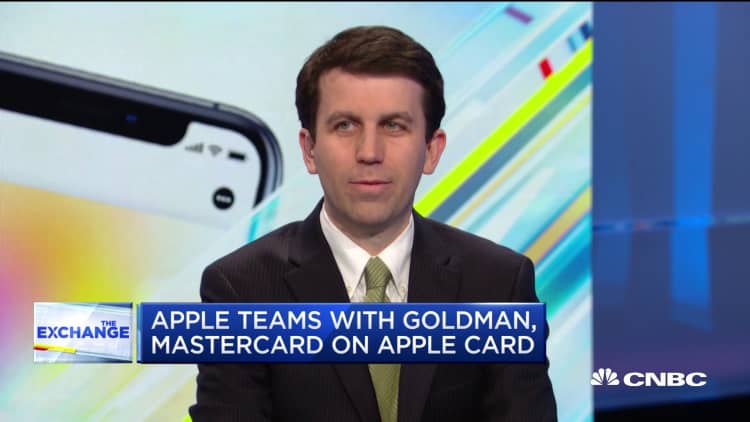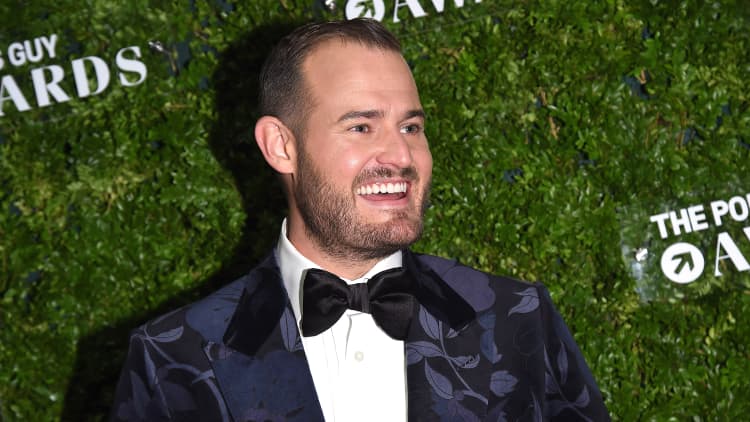Apple is rolling out a new credit card that promises 2% cash-back rewards on everyday purchases without any pesky fees. There is, however, some fine print.
During its event in March, the company introduced the Apple Card, a primarily digital card that will live in the the Wallet app on users' iPhones and will be available this summer.
As Jennifer Bailey, Apple's vice president of Apple Pay, put it after the launch event, "Apple Card is designed to help customers lead a healthier financial life, which starts with a better understanding of their spending so they can make smarter choices with their money."
Many credit card and financial experts, however, remained unconvinced.
How the Apple Card's cash-back rewards work
For purchases made with the digital card using Apple Pay, the company is offering a 2% cash-back reward, which it calls "Daily Cash." Any purchases made at the Apple Store, App Store or for other Apple services earn 3% cash back.
Update: Since launch, Apple continues to add new merchants that offer 3% cash back when you use your Apple Card via Apple Pay. New additions include: on Uber and UberEats, at Walgreens and Duane Reade stores, on the Walgreens app, on walgreens.com and at T-Mobile stores.
Apple says card-holders will be able to use their rewards right away for any Apple Pay spending.
The digital Apple Card will be part of Mastercard's global payment network and backed by Goldman Sachs. Apple CEO Tim Cook said that 70% of U.S. retailers currently accept Apple Pay and, by the end of the year, the service will be available in more than 40 countries.
There are times where digital just isn't an option, though, so Apple will also provide every user with a titanium card. Purchases made with the physical card earn 1% cash back, according to the company.
Perhaps the most impressive perk of this credit card is that there will be no fees. No annual fee, no late fees, no foreign transaction fees, nothing. Apple says it will offer lower interest rates than competitors, too.
'OK, but not great': Why some experts aren't impressed
Ted Rossman, industry analyst at CreditCards.com, says he's underwhelmed by the Apple Card. "This card will get a lot of headlines, but its bark is greater than its bite," he says.
He'd instead suggest consumers try the Citi Double Cash because it's lucrative and easy-to-use. It earns cardholders 2% cash back on everything, not just Apple Pay purchases. CNBC Make It estimates you'd be able to earn $437 cash back a year with this card if you spend roughly $21,800, which is the average amount Americans paid for retail purchases last year according to the location intelligence firm Esri.
If you want to get the most of out of purchases on Apple Pay, Rossman recommends the U.S. Bank Altitude Reserve Visa Infinite card. This card gives 3 points per dollar on mobile wallet spending. When you redeem those points, they're worth 3% cash back or 4.5% off travel, he says.
"That's really interesting: U.S. Bank offers better Apple Pay rewards than Apple," Rossman says.

And while the "no fees" aspect is nice, Rossman says the idea isn't unique to Apple. The PenFed Promise Visa and the Citi Simplicity don't charge fees either. "It's a common theme for me with the Apple Card — their features aren't as novel as they might think (whether it's rewards, fees, interest rates, budgeting tools, etc.)," he says.
The other downside: You need an iPhone to take advantage of the digital rewards associated with this credit card, so Android users could end up frustrated. "Because this card is so integrated with Apple Pay, you need to be an iPhone user to maximize your benefits," Rossman says.
The analysts at Goldman Sachs, Apple's banking partner for the new card, also raised concerns about the focus on Apple Pay perks.
"Even though Apple Pay is becoming more available, we would still expect a large percentage of transactions to be done at the 1% return level (using the physical card) so we would expect the typical consumer to perceive the cash return rate to be OK but not great," the analysts wrote.
The new credit card may still be a good choice
The Apple Card may not be revolutionary, but the "no fee" aspect of this card paired with cash-back rewards help it stand out.
The card could be helpful for those who occasionally slip up on their card payments. And that's a lot of users: About 42% of people admit they've missed a credit card payment, while 17% said they had skipped paying their card two to four times, according to a survey of 1,000 people conducted by CreditCards.com.
Those charges can really add up. When it comes to late payments, cash-back cards charge average of $36.36 if you don't pay your monthly bill on time, USA Today found. If your payment bounces, your credit card may charge you another fee, which averages out to $34.24.
So if you miss a payment four times, it will cost around $145 in fees, and that's before you add in other normal credit card charges, such as foreign transaction fees and high interest rates.
Right now, the average credit card charges an annual fee of $17.35 and a 1.5% foreign transaction fee, according to WalletHub. Cash-back credit cards in particular currently charge APRs of 17.58%, on average, according to CreditCards.com. Variable APRs for the Apple Card will range from 12.99% to 23.99%, based on your credit.
So having a new no-fee credit card on the market is no small thing. And with Apple, unlike with Citi or PenFed, you're getting cash back, too.

Let's say you spend roughly $21,800 a year, the average Americans spent on retail purchases last year according to the location intelligence firm Esri. If you paid for just 50% of your purchases through Apple Pay and the rest through the physical Apple Card, we calculate you'd earn $328 cash back during your first year.
That's $109 less than what you'd earn with Citi Double Cash, but you would not be charged the fees that this Citi credit card can levy.
Additionally, the Apple Card claims it can help you feel safer. The fact that the physical card has no number, no CVV security code and no signature makes the Apple Card "more secure than any other physical credit card," Apple says.
And on CNBC's "The Exchange," Markets Reporter Kate Rooney told Kelly Evans that the Apple card could be a game changer because the company has proven it is really good at handling customer data and protecting privacy.
Many of the details of the new Apple Card have yet to be released. But, from what's known so far, if Apple can provide a no-fee, cash-back credit card that helps keep you safe from fraud, it may be worth adding to your line-up.
Apple declined to comment in response to the card's critics.
Don't miss: The 4 credit cards to have if you want to maximize cash back
Like this story? Subscribe to CNBC Make It on YouTube!



